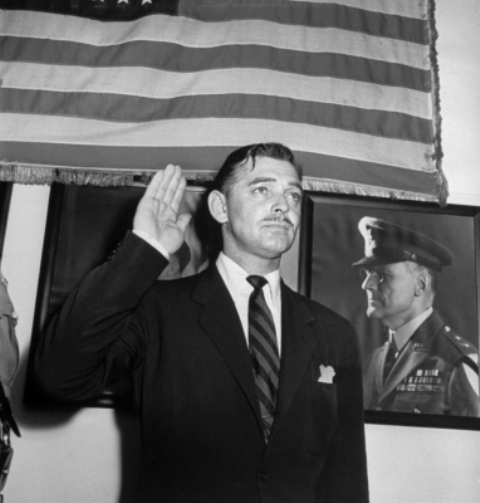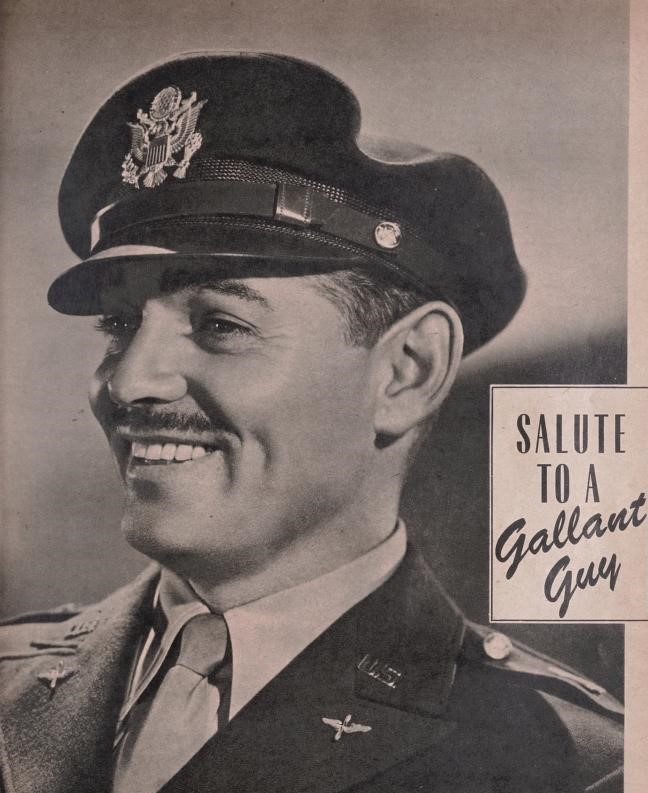Veterans Day: Speaking of Heroes
A letter from the editor of Photoplay magazine, November 1942:
Speaking of Heroes
There isn’t a movie-goer among us who didn’t respond with quick emotion when Clark Gable enlisted as a private in the Air Corps of the United States Army, or who failed to feel a sense of elation reading the news less than three weeks later that Tyrone Power had been sworn in as private in the Marine Corps and that Henry Fonda, without advance word, had enlisted in the Navy.
These men gave up adulation, riches and fame to become soldier, marine and sailor without rating. This did not make them heroes, but it did something else. It gave us all inspiration in the knowledge that they had voluntarily exchanged plesant jobs at large weekly salaries for humble, dangerous work in the ranks.
Yet there are those in Hollywood who say that neither Gable, nor Power nor Fonda should have enlisted. Those who say this speak from honest conviction and a sincere desire to prevent any harm to the motion-picture indistry and its tremendous morale value during war. They say simply that without its stars Hollywood cannot continue to produce great movies such as “Mrs. Miniver.”
It has been asked before on this page: Should stars be given deferment, forced to accept deferment so that they can continue their movie-making? It is no longer an academic discussion. Stars are leaving every week. Should they be left free to seek their place in the uniformed ranks?
I think so. Those countries who already have tasted the bitter tears of total war have taken their movie and stage heroes into the armed forces. English and Russian stars serve in the front lines, sharing the deadly peril of hurling back the Nazis and, as another part of their duty to their nation, return on leave to appear in films.
Clark Gable, on leave from active service, can play the part of air corps fighter with honesty and realism.
Tyrone Power on furlough can be cast as marine and both he and audiences will known that his interpretation of the part does not come only from a knowledge of how to apply grease paint.
There is no gauge with which to measure the depth of a man’s inner conflict, but it was obvious to those near Clark Gable this past spring and summer that he was a man torn by emotions. With the attack on Pearl Harbor he was ready for immediate enlistment. Only tremendous pressure forced him to wait. After Carole Lombard’s death, he stayed on to finish a film that was already begun. But with the last possible retake finished he took the step he had decided he must, and that day the weeks of quick, bitter temper and aching restlessness disappeared.
I have been told that the morning he was to be sworn in, he was so impatient he forgot to eat breakfast until halfway to the induction center. Stopping at a counter for coffee, he caught his coat and jerked a button off. He felt he couldn’t be sworn in that way. Hurriedly he searched the neighborhood for a clothing shop and found one a block away run by a wrinkled, irascible proprietress. When he asked if she would sew on the button for him, she refused indignantly. They sold suits in her store, they did not repair them. He pleaded with her, saying he was about to be sworn into service and that he couldn’t appear with an unbuttoned coat. It was then the lady looked up in her anger and recognized him. Instantly she was out on the sidewalk spreading the news. An excited crowd gathered and solemnly watched as the button was sewed back into place.
Public instinct in a democracy of free people is sure, the only true force for right. The public has welcomed Clark Gable, soldier; Tyrone Power, marine; Henry Fonda, gob–just as the public will welcome these citizen heroes when the time comes for them to return from their war roles and assume their peacetime roles once more.

